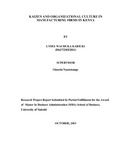| dc.description.abstract | The underpinning principle of KAIZEN (Japanese word for continuous improvement) is
the use of various problem-solving tools for the identification and solution of work-based
problems. The aim is for improvement to reach new ‘benchmarks’ with every problem
that is solved. To consolidate the new benchmark, the improvement must be
standardized. Continuous improvement (CI) as a collection of activities that constitute a
process intended to achieve performance improvement. In manufacturing, these activities
primarily involve simplification of production processes, chiefly through the elimination
of waste. In service industries and the public sector, the focus is on simplification and
improved customer service through greater empowerment of individual employees and
correspondingly less bureaucracy. Acquisition and use of skills for process analysis and
problem solving are seen as fundamental to CI in the private and public sectors.
Organizational culture of firms in the manufacturing industry is influenced by diverse
cultural values of people including: their family structures, educational structures,
religious organizations, associations, forms of government, work organizations, law,
literature, settlement patterns, and buildings. All of these reflect common beliefs that
derive from the common culture that determine organizational performance. The study
established that there was positive correlation on Kaizen practices and organizational
culture in relation to performance of manufacturing companies.. The study established
that motivation among employees like; inability of management to involve them in
decision making, lack of promotion, recognition of hardworking employees, lack of
training, salary increment and poor working environments were factors that affected
Kaizen practices within the organization context. Therefore, this study recommends that
management to motivate employees using both monetary and non monetary rewards for
better performance. | en |

